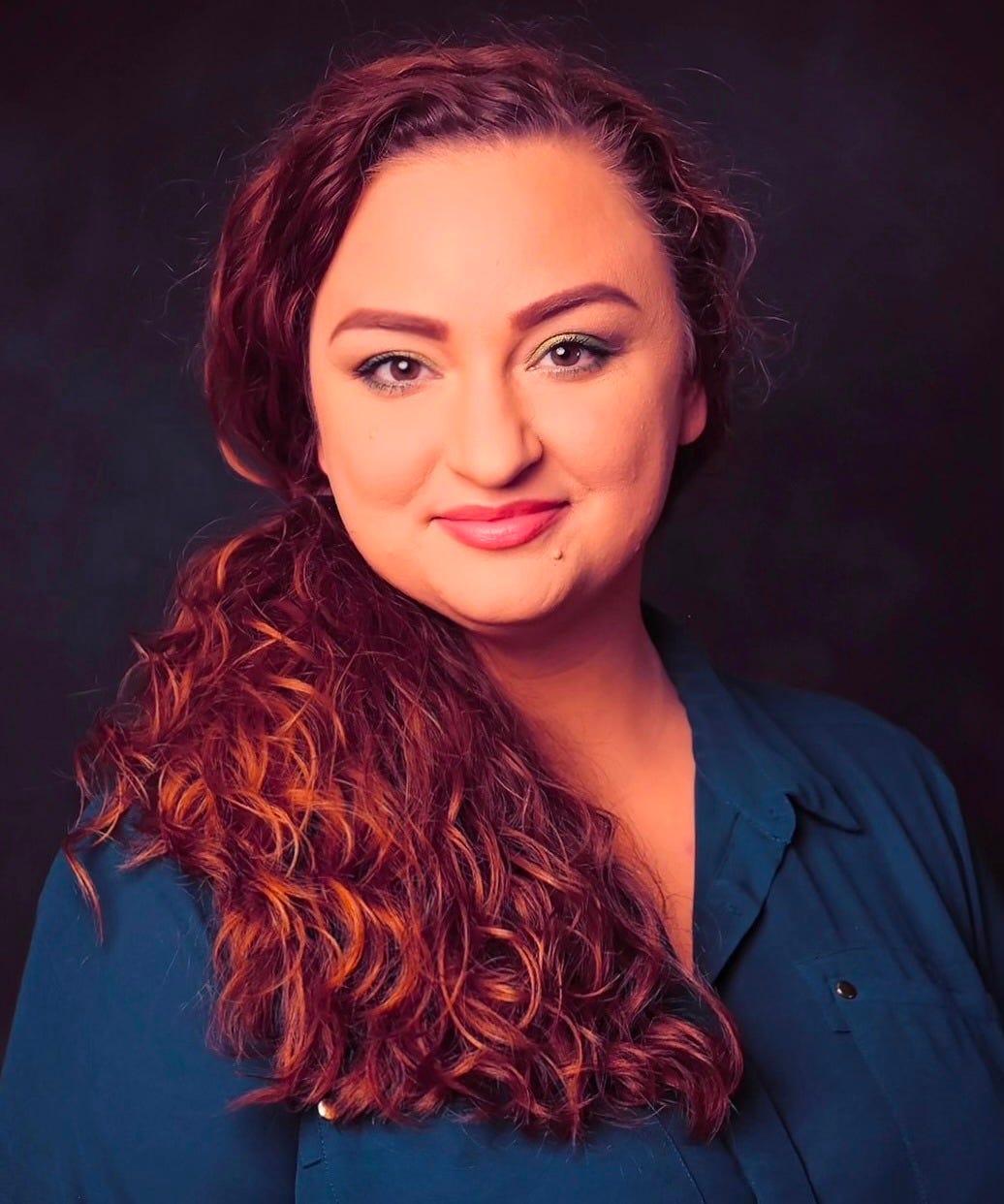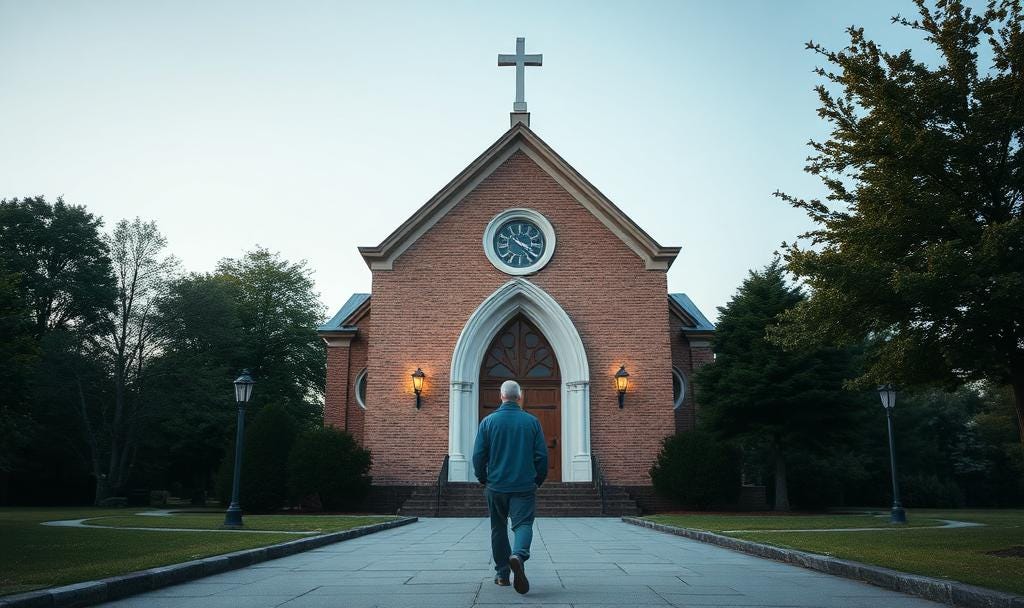No One Is Coming to Save You, But You’re Not Alone
On healing religious trauma, embracing spiritual freedom, and returning to community without losing yourself.
Anyone who knows me personally knows that I have a deeply inquisitive mind. I ask a lot of questions - sometimes the kind people would rather not answer. Maybe it’s my neurospicy wiring, but I love direct communication. I love getting to the root of things. Being able to take complex ideas and distill them into something clear… it massages my brain in a way that makes me happy.
Because of that, organized religion has always presented a kind of tension for me. (And this is coming from someone who served as a Chaplain for 2 of my collegiate years… one of my former students still calls me “Holy Ghost” to this day, 20+ years later.)
Faith, as many of us were taught, is meant to serve as a bridge between material reality and divine mystery. But sometimes it’s used as a way to shut down inquiry. To defer truth-seeking in favor of certainty. To label doubt as danger. And if we’re not careful, what was meant to carry us closer to the divine can become the very thing that keeps us from looking within.
I’m going to hold your hand when I say this:
Spirituality isn’t the easier path.
Spirituality Isn’t the Easy Road (and Why Some Return to Religion)
Many of us think that leaving organized religion for spirituality is a choice for freedom. And at first, it can feel that way. We shed the rules, the rigid expectations, the shame, and the fear of punishment that once shaped every decision.
But spirituality - real spirituality - likely asks more of us than any religion ever has.
Without a savior to pay our debts, there’s no one to absorb the weight of our choices. Without a ready-made moral code, we have to decide for ourselves what is right and what is true. Without a built-in community to assure us of our worth, we have to cultivate that sense of belonging from within.
It’s just us.
Our choices.
Our shadows.
Our healing.
Our responsibility.
That’s why some of us return to religion. Not because we’ve failed, but because it’s easier to surrender accountability than to stay in the mirror. Easier to accept ready-made answers than to sit with the discomfort of not knowing. Easier to be saved than to become sovereign.
But for those of us who stay the course - who keep showing up for ourselves - the peace we find isn’t borrowed. It can’t be given or taken away.
Why Spirituality Is Hard
Most of us don’t leave religion expecting to carry more weight. We expect freedom. The relief of no longer answering to rigid authorities or inherited beliefs. The excitement of choosing our own path.
But what often comes next is a quiet reckoning.
Without someone else defining what is right and wrong, we have to decide for ourselves. Without the promise of salvation, we become responsible for our own healing and the harm we’ve caused. Without a shared doctrine or community to absorb the uncertainty, we have to sit in it. Alone, at least at first.
Spirituality doesn’t let us outsource responsibility. It requires us to face the patterns we created for survival and the choices we’ve made out of fear or habit. It requires us to acknowledge not only who hurt us - but who we may have hurt. It asks for an honesty most people spend their lives avoiding.
That’s the part many of us don’t see when we start walking this path. The freedom we imagined is real. But it’s not the freedom of being unburdened. It’s the freedom of carrying only what is truly ours and finally becoming strong enough to hold it.
This is what deconstruction really looks like - not just pulling apart what no longer fits, but sitting with the space it leaves behind. Learning how to trust yourself again in the absence of certainty.
Why Religion (For Some) Feels Easier
For those of us who find spirituality overwhelming, returning to religion can feel like coming home. There is comfort in clarity. There are rules to follow and leaders to defer to. Right and wrong are defined. The mystery is explained—or at least contained.
In religion, we don’t have to decide everything for ourselves. We can follow. We can belong by agreement, not by personal excavation.
Perhaps most importantly, we are offered absolution. In many traditions, a savior carries the burden of our faults. Our debt is paid. We are forgiven. Redemption becomes something given to us, not something we must forge in the fires of our own accountability.
For those of us who have experienced trauma or disconnection, this can be a powerful relief. But for many, it can also become an escape. A way to avoid facing the parts of ourselves we fear to examine.
Religion, at its best, offers community and comfort. At its worst, it offers an easy exit from the sacred responsibility of growth.
The Bypassing Trap (Even in Spiritual Spaces)
Leaving organized religion doesn’t make us immune to bypassing. In fact, spiritual spaces are often full of it.
We swap out Bible or scriptural verses for affirmations. We trade sermons for sound bowls. But we still avoid the discomfort. Still seek relief instead of transformation.
Spiritual bypassing looks like:
Explaining away pain with "everything happens for a reason"
Using "love and light" to avoid naming harm
Calling it "letting go" before we’ve even fully felt it
Hiding behind healing language instead of practicing healing itself
It can happen in yoga classes and tarot readings just as easily as it can in churches. And it usually sounds soft, but moves fast. It avoids the slow, gritty, embodied work of integration.
Just because we’re no longer inside the walls of religion doesn’t mean we’ve escaped avoidance. Sometimes we’ve just dressed it differently.
The Real Sacred Work
True spirituality requires us to face ourselves. Over and over again. It asks us to walk into the inner rooms we’ve boarded shut. To trace our reactions back to their origins. To speak truth, even when it trembles in our throat.
It means taking full responsibility for our choices, our healing, and the way we move through the world. It means making peace with complexity. Sitting with grief. Unlearning what we were praised for. Becoming honest about what we’ve used to survive, and deciding whether it still serves us.
This work is not fast. It is not linear. It is not always beautiful. In fact, it is oftentimes messy.
But it is sacred.
Because when we sit with it and stay, we begin to build something that no one else can build for us or take away. And that is a self that is rooted, not performative. A life that is aligned, not just admired. A spirituality that is lived, not worn.
We stop needing someone to save us.
We become responsible for saving ourselves.
And that, to me, is where the real freedom begins.
Integration: Returning Without Losing Ourselves
For some of us, healing doesn’t mean cutting off all ties to organized religion - even if we need to take a break from it for a spell (as I personally did). In fact, the deeper we go into our spiritual sovereignty, the more we may find ourselves reclaiming parts of those traditions - but on our own terms.
Integration is not a return to blind faith. It’s a conscious revisiting of what once held meaning, this time with awareness. We can choose to sit in a pew again, sing the old hymns, or recite familiar prayers, not because we’ve abandoned ourselves - but because we’ve found ourselves.
It’s important to note, integration isn’t the undoing of deconstruction. It’s the fruit of it. It’s what happens when we’ve honored the unraveling long enough to start weaving something new.
We begin to notice what resonates and what doesn’t. We take what feels alive and leave what feels fear-based or doesn’t serve our growth. We give ourselves permission to belong without betraying our discernment.
And sometimes, we find communities that surprise us. Faith-based spaces that are evolving. Congregations that allow for mystery, nuance, questioning, and a wider definition of inclusion.
These places do exist. They might not look like what we grew up with, but they remind us that spirituality and structure don’t have to be at odds.
Integration is choosing to return to sacred spaces not because we need to be told who we are - but because we now know. And we want to bring our whole selves into the room.
Tips for Healing from Religious Trauma
If you're on this path and feeling disoriented, raw, or unsure, you're not alone. Healing from religious trauma - or even naming it trauma - takes time, and it often asks us to unlearn what we were taught to fear, question what we were taught to follow, and feel what we were taught to suppress. Here are some practices that may support you:
1. Let yourself grieve. You may be grieving a version of God, a sense of belonging, or even a former self. Give yourself permission to mourn what was lost, what was taken, or what never was.
2. Reclaim your autonomy. You get to decide what you believe. You get to ask questions. You get to change your mind. Practice making small, spiritually sovereign choices that align with your inner knowing.
3. Watch for internalized judgment. Notice when old messages play on loop: shame for resting, fear of punishment, guilt for doubting. Ask: Whose voice is that? Is it mine? Do I want to keep it?
4. Create new spiritual rituals. They don’t need to look like church. A walk in the woods, lighting a candle, pulling a card, singing aloud, or journaling your dreams can all be sacred. Make it yours.
5. Find safe community. You don't have to heal in isolation. Seek out people who honor your autonomy and don’t rush your process. Community should feel like curiosity, not control.
6. Let the body speak. Religious trauma often lives in the nervous system. Somatic movement, breathwork, and trauma-informed therapy can help you release what was stored when you couldn’t speak it.
7. Take your time. You don’t have to rebuild your beliefs overnight. Let yourself be in the in-between, the not-knowing. That space is sacred too.
Final Thoughts (A Benediction, If You Will)
No one’s coming to save you.
But you’re here.
And that’s enough to begin.










I’m going to apologize for my novel of a response but this hit home for me.
I was raised in pews and revival tents, taught to fear hell more than harm, and to trust obedience over instinct. It was a tight, unyielding theology with very little room for asking the kinds of questions my brain couldn’t shut off. When I did ask about contradictions, cruelty, or control, I wasn’t met with answers. I was met with shame.
Being autistic in a world built on “don’t ask, just believe” is a recipe for spiritual claustrophobia.
Walking away wasn’t freedom at first. It was grief. It still is, sometimes. I didn’t reject faith. I rejected being spiritually gaslit. I rejected a version of God that only spoke through angry men and always wanted me smaller.
What I found outside the church wasn’t peace. It was silence. And for a while, that silence was terrifying. No hymns to hum. No scriptures to soothe the ache. Just me, my questions, my rage, and the long, slow work of pulling the splinters out one by one.
Real spirituality does not coddle. It does not hand you a script. It hands you a mirror.
It is not soft. It is not always beautiful. It is gritty and personal. It is rebuilding a self you never got to be, without knowing who that self is yet. It is deciding what kind of ancestor you want to become while carrying the scars of the ones who came before.
Sometimes, I miss the certainty of religion. But I do not miss the price I paid for it.
Now, when I light a candle or sit in stillness, it is not to prove I am good enough for grace. It is to remind myself I never had to earn it.
Some of us did not leave religion to escape responsibility. We left because it was the only way we could begin healing on our own terms.
And yes, that road is harder.
But it is mine.